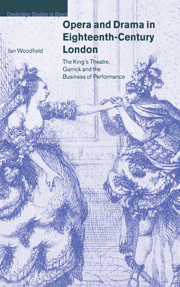 Opera and Drama in Eighteenth-Century London
Opera and Drama in Eighteenth-Century London Book contents
- Frontmatter
- Contents
- List of tables
- List of musical examples
- Acknowledgements
- A note on conventions
- Introduction
- 1 The Hobart management
- 2 The new managers take control
- 3 Sacchini and the revival of opera seria
- 4 Recruitment procedures and artistic policy
- 5 The King's Theatre in crisis
- 6 The recruitment of Lovattini
- 7 The English community in Rome
- 8 Lucrezia Agujari at the Pantheon
- 9 Caterina Gabrielli
- 10 Rauzzini's last season
- 11 The King's Theatre flourishes
- 12 The Queen of Quavers satire
- 13 Financial management
- 14 Opera salaries
- 15 The sale of 1778
- Appendices
- Notes
- Bibliography
- Index
3 - Sacchini and the revival of opera seria
Published online by Cambridge University Press: 22 September 2009
- Frontmatter
- Contents
- List of tables
- List of musical examples
- Acknowledgements
- A note on conventions
- Introduction
- 1 The Hobart management
- 2 The new managers take control
- 3 Sacchini and the revival of opera seria
- 4 Recruitment procedures and artistic policy
- 5 The King's Theatre in crisis
- 6 The recruitment of Lovattini
- 7 The English community in Rome
- 8 Lucrezia Agujari at the Pantheon
- 9 Caterina Gabrielli
- 10 Rauzzini's last season
- 11 The King's Theatre flourishes
- 12 The Queen of Quavers satire
- 13 Financial management
- 14 Opera salaries
- 15 The sale of 1778
- Appendices
- Notes
- Bibliography
- Index
Summary
Sacchini's brilliant debut marked a turning point, not only in the financial fortunes of the King's Theatre, but also in the revitalisation of opera seria as a genre in London. The extraordinary impact of Il Cid and Tamerlano struck Charles Burney so forcibly that he later singled them out for special commendation, describing the two operas as ‘so entire, so masterly, yet so new and natural, that there was nothing left for criticism to censure, though [they had] innumerable beauties to point out and admire’. He also felt it worthy of note that Sacchini had been ‘totally occupied with the ideas of the poet, and the propriety, consistency, and effect of the whole drama’. In the light of this last comment, the remarkable reception accorded to Il Cid is best interpreted against the background of the pasticcio culture that had come to dominate opera seria at the King's Theatre. The decline of serious opera had in fact been so marked that the employment of a good composer (as distinct from an arranger) was coming to seem almost superfluous. The total number of performances of original works in the three years before Sacchini's arrival had dwindled to a mere thirteen, eight of Guglielmi's Ezio, two of the same composer's Demetrio and three of Cocchi's Semiramide riconosciuto. London seemed in danger of forgetting the theatrical impact that a drama under the creative control of a single musician could have.
- Type
- Chapter
- Information
- Opera and Drama in Eighteenth-Century LondonThe King's Theatre, Garrick and the Business of Performance, pp. 40 - 51Publisher: Cambridge University PressPrint publication year: 2001


